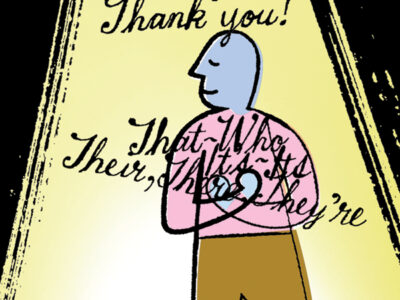
Class of ’00 | Shivani Tibrewala C’00 is spreading the word—thousands upon thousands of them, in multifarious media and genres.
For starters, there’s her Mumbai-based theater company, No License Yet, which she started 12 years ago. To fuel it, she’s written nine plays, and will be coming out with two more in the coming year. She has put together poetry slams and writing workshops for kids, and is finishing up a collection of poetry and working on a novel. She writes for film and TV, for herself and for anyone who wants to read or listen or watch.
“There are moments when I get completely detached from whatever is happening, and suddenly I feel like I’m outside looking in,” she says. “It feels like a movie. And then I think, ‘This should be a movie.’” Or maybe a play. Or a poem.
Tibrewala wrote her first play during her senior year at Penn. It was based on Tom Kromer’s Depression-era novel Waiting for Nothing, which was required reading for one of Professor Rita Barnard’s literature classes.
“I think that book and I were just meant to find each other,” Tibrewala says. The fact that it had been out of print for 30 years (Tibrewala still hasn’t released the play because she can’t figure out whom to contact about the rights) made her even more determined to write her play and shed new light on Kromer’s work.
The play had some 30 characters, which presented some casting challenges. Tibrewala parked herself along Locust Walk, “and when somebody passed by that I thought was right for the part, I’d actually walk up to them, a complete stranger, and I’d say, ‘You need to be in my play,’” she laughs. “It’s really crazy when I think about it now.”
“Penn is really where it all started,” says Tibrewala, who is now working on a novel about her alma mater.
After graduating with a degree in English literature, she returned to her native Mumbai and went into the more practical field of public relations.
Then came September 11, 2001.
“It was a bit of a dramatic moment in my life,” says Tibrewala, who knew people who lost loved ones. “That’s when I decided that I didn’t want to be sitting in some office, have a plane flying through the window and think, ‘I should have written when I had the chance.’” She quit her job, and soon after, founded No License Yet.
Explaining the decision to her friends and family was not easy.
“It’s an unconventional profession,” Tibrewala says. “I come from a family of doctors, and I think it was really hard for me, at some level, to deal with the fact that theatre wasn’t considered a vocation.”
Twelve years and eight productions later, Tibrewala has hardly looked back. No License Yet has staged plays all over India, as well as in Europe and Canada. And Tibrewala has worked with some of India’s best actors, including Bollywood superstar Tom Alter, who has starred in several of her plays.
Her other projects fell into place soon after. She took on freelance work developing scripts for film and TV to make a few extra bucks, and she decided to build up a poetry-slam scene in Mumbai as a way to get more young people excited about writing.
Whatever the form and genre of her work, she’s not afraid of tackling big issues. Her play The Laboratory is about multinational pharmaceutical companies that conduct unethical drug trials in India. Staying Alive is a dance opera that portrays seven characters on the brink of suicide. After one performance, a woman approached her.
“She put her head on my shoulder and just wept, for, like, half an hour,” Tibrewala recalls. Other people had lined up to speak with Tibrewala, but “they all left when they realized this woman wasn’t going away.” When the woman finally pulled away, Tibrewala says, “she revealed something very personal to me, about a family member who committed suicide 20 years ago. That was the first time she had cried about it.”
Tibrewala’s play Whatever You Say (about an estranged couple) had a similarly profound effect on a couple, though the result was slightly more upbeat.
“This young girl had come for one of my shows,” Tibrewala recalls, and afterwards sent her an email saying that even though she and her boyfriend had been on the verge of breaking up, they decided to give it another shot after seeing the play. “That,” says Tibrewala convincingly, “was pretty great.”
—Maanvi Singh C’13




